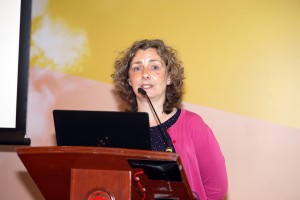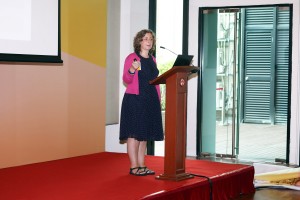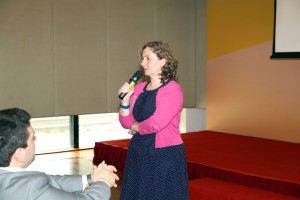A keynote at Lingnan’s postgraduate conference discussed the merits of university league tables
How have university league tables and other methods of evaluating educational institutions affected the way that research is carried out? A keynote at Lingnan University’s Postgraduate Conference on Interdisciplinary Learning, given by Dr Lisa Lucas, co-director of the Centre for Knowledge, Culture and Society at Bristol University in the UK, addressed this salient topic. The conference, which discussed the benefits of interdisciplinary learning and research, took place March 28 and 29 at Lingnan University’s Leung Fong Oi Wan art gallery in Hong Kong.
Dr Lucas’ presentation “Rankings, research assessment and researchers: knowledge production in a global context” drew on many years of evaluating university research and funding. Dr Lucas began her keynote with some questions. “We have seen the rise of university rankings and league tables, and we have also seen competition between universities grow,” Lucas said. “There is lot of talk about the idea of a ‘world class university’. But terms of the ranking system, what does it actually mean to be a world class university? Furthermore, what are the consequences for national systems of education when a so much energy is spent on achieving this idea of being a world class university?”
Dr Lucas began by running through the more famous rankings – the Shanghai Jiao Tong rankings (ARWU), the Times Higher Education rankings, and the QS World University rankings -- noting their different aims and methodologies. “The Shanghai Jiao Tong ranking is focused on research output and citations, and issues like the amount of staff who have Nobel Prize nominations and awards. It is focused on research excellence, and the research that is being produced in particular universities. The Times Higher Education ranking, and the methodology behind it, is quite different, and spans teaching, research, and citations, as well as international outlook,” said Dr Lucas.
Dr Lucas also mentioned the U-Multirank, a European rankings system. “That was developed in part as a response to what were seen as some of the negative consequences the global league tables in terms of the emphasis being placed on global competition. The U-Multirank allows a more interactive experience. You can look at global rankings and the league table in terms of disciplines and more nuanced measurements, as opposed to those that are more common in some of the rankings we are familiar with,” Dr Lucas said.
The rankings should be used with care. “It’s important not to take these league tables literally, and important to think about how they are being used, and how we can critique and challenge some of what lies behind them, given that they do have a huge effect on the higher education sector across the globe,” Dr Lucas said. For instance, the rankings are dominated by universities in the West, she noted: “The US tends to dominate research output around the world. The UK does quite well. What you see is a very Western dominated picture in relation to the output of knowledge production around the world.”
But the distribution of knowledge production around the globe is starting to change, Dr Lucas noted, especially in the UK, where research has declined due to the uncertainties raised by Brexit. “There was been a dramatic increase in China from 2003 to 2016. Britain has been flatlining in terms of its influence around the globe, while America looks as though it has reached its peak. There is a huge surge in terms of output from China. It’s important to note the landscape is changing, although the output from Western countries is quite established,” Dr Lucas said.
As part of her critique, Dr Lucas quoted R.A. Shahjahan’s description of the ranking as an academic arms race. “Reacting to how we are concentrating our energy on the idea of how we can become global universities, and how we can compete in these international league tables could be detrimental to the particular research work that’s necessary in a national and regional context,” Dr Lucas said.
Shahjahan also talks about monocultures of the mind, Dr Lucas said. “If we take on board the kind of dominance that still exists in relation to the output of research around the world being dominated by Western societies and universities, it can create problems for the way that we think about the kind of knowledge that’s important in different parts of the world. It could lead to a kind monoculture in terms of thinking,” Dr Lucas said. “Things are changing, but there are still challenges in terms of how we can raise important questions about different ways of doing research, and the ways in which we value research that is being done in different parts of the world. That is hugely important.” Dr Lucas said.
Dr Lucas noted that Ellen Hazelkorn [from the Dublin Institute of Technology] researched the effect that the emphasis on global league tables has on universities, as they try and to create circumstances whereby they can compete in the league tables. “[Her work relates to] issues about the way research is organised within institutions, issues in faculty, and how the academic world is changing in relation to the league tables. Obviously public image and marketing are huge factors,” Dr Lucas said.




